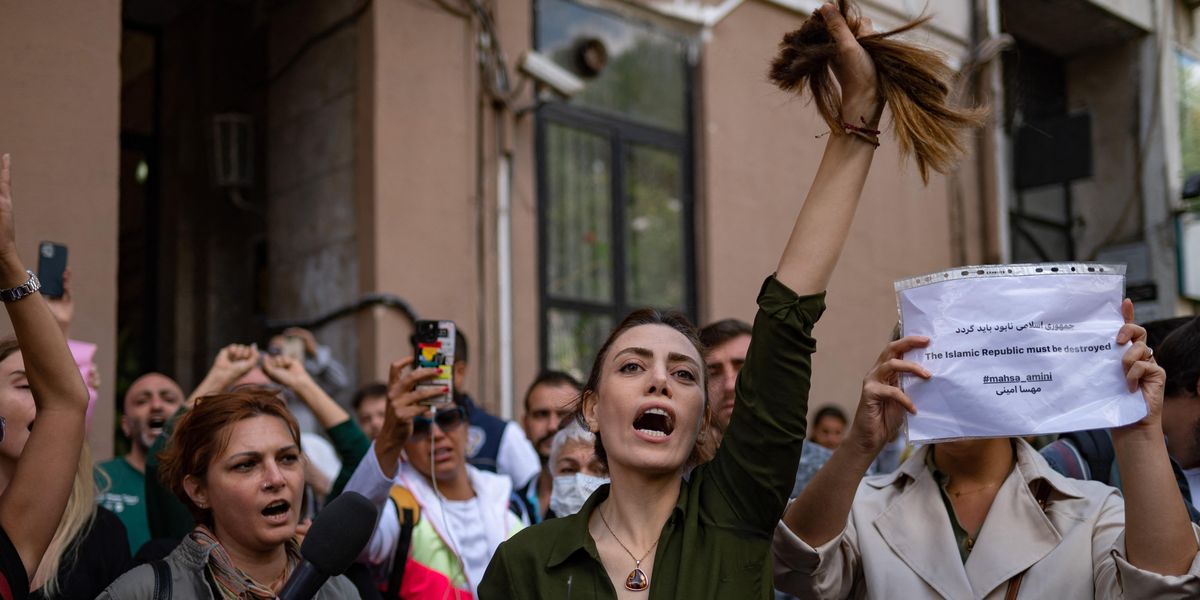
For the past 11 days, cities across Iran have been overrun by female protesters challenging the Iranian government's repressive treatment of women following the death of Mahsa Amini. One of the largest protests to rock the country in years, the increasingly violent demonstrations have already led to at least 76 deaths and hundreds of arrests in over 80 cities, per BBC's latest report. However, these risks still haven't stopped Iranian women from taking to the streets to fight for their personal freedoms, many of whom are also cutting their hair and burning their hijabs in a show of anti-government sentiment. But why exactly is that the case?
What caused the protests?
On September 13, 2022, the 22-year-old was visiting the capital Tehran with her family when she was arrested by morality police for allegedly wearing her hijab, or headscarf, improperly. Amini was brought to a detention center to be "educated" on the country's strict dress code laws, where authorities claim she later collapsed after suffering from "sudden heart failure." She was then taken to a hospital and spent three days in a coma before passing away on September 16.
That said, Amini's family believes officers beat her to death, insisting that she was perfectly healthy prior to her arrest and did not have a history of heart problems. Her brother, Kiarash Amini, also said he heard screaming from outside the detention center while waiting for his sister to be released, where he was told that security forces had killed a young woman, according to the New York Times.
Following her death, a photo and video of a bloody and bruised Amini lying unconscious in a hospital bed was posted online, with the publication reporting that multiple Iranian doctors on Twitter are saying she could have sustained a concussion from several head trauma.
What's the context?
Iran has been a theocracy since the revolution in 1979, when ultraconservative Muslim clerics seized power and introduced Islamic Sharia Law, under which all women over the age of 9 are required to cover their hair with a hijab and wear long, loose-fitting clothing to protect their chastity and honor. Noncompliance with the law can lead to fines, public shaming or arrest by the "Gasht-e Ershad," or the morality police, who arbitrarily enforce what they deem to be "proper" displays of public religious observance.
For decades, Iranian women have been protesting against a number of patriarchal laws instated by the authoritarian government, including legislations that lowered the marriage age for girls and lifted restrictions on male polygamy. Adding to the furor are also other persistent sociopolitical issues, from government corruption to economic sanctions from the West to tightening social restrictions under the administration of current President Ebrahim Raisi, such as the resumption of dress code arrests after a five-year lull. So as a response to Amini's death in relation to the hijab law, Iranian women are cutting their hair and burning their headscarves as a way to demand its repeal and the fall of Supreme Leader Ayatollah Ali Khamenei.
What's happening now?
Since Amini's funeral on September 17, Iranian officials have been accused of police brutality and disproportionate force over their alleged use of live ammunition, pellet guns and tear gas to control protesters, with Iran Human Rights Director Mahmood Amiry-Moghaddam explaining that "the risk of torture and ill-treatment of protesters is serious and the use of live ammunition against protesters is an international crime."
"The world must defend the Iranian people's demands for their fundamental rights," as Amiry-Moghaddam said. The UN Human Rights Office has also condemned the government's actions, saying that it's become "increasingly concerned" and called on authorities to allow protesters to exercise their right to protest peacefully. Both entities are also questioning official fatality and arrest numbers, based on reports of the rising death toll and governmental restriction of the internet.
However, there are no signs of the violence ending anytime soon, as BBC reported that President Raisi has continued to emphasize the need to "take decisive action against opponents of the security and peace of the country".
How can I help?
As with any developing situation, it's always paramount to follow trustworthy sources on the ground. Due to increasingly heavy restrictions on the internet though, it's been difficult for Iranian activists to spread the word via social media. Granted, it's still helpful to keep tabs on what's happening through Iranian American human rights organizations like the Abdorrahman Boroumand Center and the Center for Human Rights in Iran.
Once you have all the information, you can then start contacting your representatives, spreading accurate news and finding local solidarity protests to join, all while donating to and directing others to the aforementioned groups.
Photo via Getty / Yasin Akgul / AFP
From Your Site Articles
- Iranian Actress Will Boycott The Oscars To Protest Trump's Visa ... ›
- Iranian Women Are Being Arrested For Dancing Online - PAPER ›
- Climber Elnaz Rekabi Returns to Iran Following Hijab Incident ›
- Iran Abolishes Morality Police Amidst Nationwide Protests ›
Related Articles Around the Web